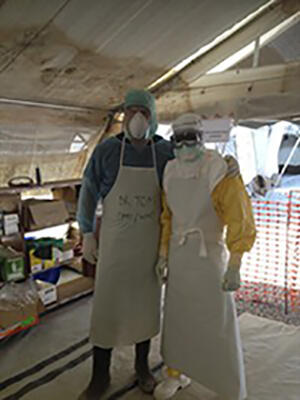
The current Ebola outbreak in numerous West African countries has seen the involvement of LSTM staff from the start of the outbreak in Guinea in March this year. Doctor Tom Fletcher, Lecturer with LSTM, was sent to Conakry, the capital of Guinea, once an outbreak of a haemorrhagic fever was being confirmed as Ebola.
He was involved in the set-up of isolation facilities and managing cases with Guinea's Ministry of Health and the international aid organisation Médecins Sans Frontières (MSF). In the following weeks the teams were able to deploy a number of experienced WHO clinicians and in partnership were able to offer a higher level of care to Ebola patients resulting in a case fatality rate drop to 40-50%, which compares favourable with the normally 70-90% case fatality rates for Ebola Zaire strain).
Following the Guinea intervention Dr Fletcher returned to the WHO in Geneva and coordinated the WHO clinical response before deploying in June to Sierra Leone after the outbreak extended there. His main role here was to support the Ministry of Health with case management and scope the environment for further WHO clinicians. For the first time the clinical team from WHO has been recruiting Infectious Diseases and Critical Care clinicians to support the outbreak from around the world.
Dr Tim O'Dempsey, a senior Lecturer in Tropical Medicine at LSTM and with previous Viral Haemorrhagic Fever (VHF) experience and with previous work experience in Sierra Leone was sent to the region and he currently leads the deployed WHO response in Kenema, Sierra Leone. Tim's experience, international reputation and his provision of tropical medicine training to aid organisations such as MSF have been very beneficial.
The situation in Ebola treatment centres remains very difficult, with high case loads and limited resources that restricts the ability to deliver good care. The situation has been further complicated by a significant number of deaths in health care workers. This outbreak is unprecedented both in size and complexity and will require a sustained regional and international response for many months to come. Clinical staff at LSTM are ideally placed to support WHO and endemic countries in such an outbreak.
This is through a combination of LSTM's ethos of working in partnership with tropical and resource limited countries and that LSTM clinical staff routinely manage critically ill patients at the Tropical and Infectious Disease Unit at the Royal Liverpool University Hospital.
The delivery of care in such a challenging and dangerous environment is based on WHO's principle of 'equity of access to life saving interventions'. Good clinical care resulting in many survivors of the disease also has a positive effect on the wider outbreak response by encouraging local communities to accept the required case isolation. This is essential to break the chain of transmission, which is the key to stop this disease spreading.